by Jenny Rose | May 3, 2018 | Contribution, Emotional Intelligence
Years ago, during a conversation about men, a girlfriend of mine said, “You have to kiss a lot of frogs.” It was the first time I’d ever heard that observation, and I’ve never forgotten the way it made me smile. Now, it’s all over the Internet, but then we weren’t numbed by such a constant bombardment of memes and phrases.
One does have to kiss a lot of frogs in life. Roommates from hell, jobs we hate, the nether regions of those more powerful than we are, all require a certain amount of kissing. Then there are sticky-faced children kisses; big-hearted sloppy dog kisses; and, my personal favorite, sandpaper cat kisses that remove the top layer of skin from one’s nose.

Photo by Andreas Fidler on Unsplash
The central preoccupation of kissing, of course, is the “romantic” kiss. We quickly learn that some kisses are more romantic than others. A lot of our personal kissing history is hurriedly filed away under the label “What Was I Thinking?” and we try to forget about it.
When I really consider it, I realize we spend much more time kissing frogs than anything else. Someone should write a manual. (Poor little frogs. I’m very fond of them. I wonder if they have metaphors about kissing princes in hopes they turn into frogs. It would only be fair.)
Leaving an old, familiar place and coming to a new one reminds me how many frogs are out there, waiting to be kissed, especially in this season when the night shrills with the insistent songs of a variety of species from tiny peepers the size of a thumbnail to enormous bullfrogs. I’ve kissed a lot of frogs trying to make new friends. I’ve kissed a lot of frogs trying to find someone to cut my hair, a massage therapist, a dentist, a doctor, and a health food store.
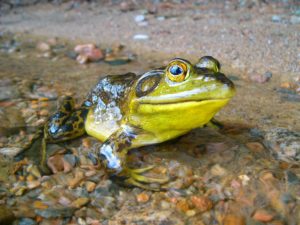
Photo by henry fournier on Unsplash
Kissing frogs takes time, and I get discouraged. I’ve never been comfortable socially. I hate trying to make a connection with strangers. I know intellectually that for every ten times I reach out to another, nine times it will be another dead end, but the tenth time something wonderful will happen. Persistence and patience do pay off.
I’ve spent my life with books. I was reading before Kindergarten (thank you, Richard Scarry, Mom and Dad). Our home was always filled with books. I have a library degree and I’ve worked in a public library and an elementary school library. In my old place, I did volunteer work for a used bookstore run by the local Friends of the Library.
I came to Maine with more than 30 boxes of books, and that was after a severe culling. My partner has at least as many books in his own library. This old farmhouse is positively groaning with our combined libraries, and we’re in desperate need of more shelving. I was disappointed to find a less robust library program than I was used to in the nearest town, and no bookstore of any kind. My first year here, I did hear of a used bookstore in a college town about 30 minutes away, and my partner and I agreed we’d go check it out.

Photo by Jazmin Quaynor on Unsplash
Three and a half years later, I finally made up my mind to stop shillyshallying around and go find that bookstore. I made a date with myself, pulled out maps, informed my partner I was going, dammit!, and we went.
Heaven. Bliss. Home. Shelves and boxes and unstable stacks of books on every surface. Hundreds of books. Thousands of books. Chairs and stepstools and round stools. Old encyclopedias. Children’s books. A huge table covered in a tornado of books.
I headed for the farthest back corner and started working my way forward through nonfiction hardback, plays, poetry, and then fiction.
A long time later, I went in search of the store owner, who was talking with my much more gregarious and extroverted partner in the casual fashion of men getting to know one another. Without preamble, I asked the owner if he had any use for a volunteer experienced in library and bookstore work. We were standing in a room I hadn’t explored yet that looked as though it had been the site of an explosion. Later, I found out a pipe had burst and flooded the place.
He thought this was a fine idea, and said I could start that minute. He also said he’d pay me in books (I made a valiant effort not to drool in front of him). I didn’t want to start that minute, so I declined, and I could tell he thought I didn’t mean it, not really. I said we’d talk. I went back to browsing, smiling to myself.
A couple hours, a heavy box and $145 later, we emerged, happy and grubby. I’d made a date to return, but the owner didn’t think I really would.
On Monday, as promised, I returned precisely on the dot of 12:15 p.m., the time he requested.
He’d hurriedly emptied several bookcases at the time of the flood, and disassembled shelves to get them out of the way. He’d been working to get the shelves back up and wanted me to load them. I asked if I could wipe down the shelves first. A raised eyebrow and surprised agreement. He found a bucket and a rag and I got to work while he searched among towering piles of heavy boxes for the books that belonged on the shelves. This was the general fiction mass market paperback section. He wanted me to weed out science fiction, fantasy, horror and mystery for other sections. He also wanted me to weed out duplicates, choosing the best copy for the shelf.

Photo by Syd Wachs on Unsplash
So began four glorious hours of squatting, bending, kneeling, sorting and alphabetizing. A bookstore invariably reflects the place it’s in. In Colorado, we had a Colorado section, naturally, featuring Colorado authors and artists. We also had a big Western section featuring Louis L’Amour and other Western writers. In Maine, there’s a Maine section and history and biography focused on the founding of the colonies, mills and seafaring. Also, a lot of political nonfiction.
The fiction is heavy on Richard Russo, Bill Roorbach, Annie Proulx and other Maine writers, as well as, of course, shelves of Stephen King.
I emptied box after box. I filled one of the empty boxes with duplicates and started another. I made leaning piles of mystery, fantasy and science fiction for other sections. Customers came and went, stepping around my boxes, bucket and piles, browsing with the quiet intensity of true booklovers. Robert, the owner, moved boxes around, answered the phone and hummed under his breath. I put aside a few books I wanted to take home.
Four hours passed like a happy dream. I asked if I could come again. He said yes, he’d be delighted. We made a date. He’s still not entirely convinced I’ll be there, but that’s okay. He’ll learn to trust me.
Coming out of the door into the spring afternoon, I was exhausted, my back ached, my hands were filthy and I was absolutely happy. I’ve found a way to volunteer again, to make a contribution doing something I love and believe in. I’ve found a place to belong with people I have something in common with.
I kissed a frog and this time it turned into a prince.
I drove home along the Kennebec River, watching the water birds and enjoying the budding trees, pools of blue hyacinths and banks of daffodils. It’s strange, the things that give our lives the greatest meaning. I thought of the frogs in every pool, pond and puddle right now, in every river and stream, singing, peeping, croaking and chuckling. How many women would look at a disordered, slightly down-at-heel used bookstore and see a prince?
I don’t know. I don’t care. I’m happy. I have that excited feeling of anticipation we get when a new door opens. Through books and volunteer work I’ve found dear friends, great jobs, meaning and purpose. Dreams I didn’t know I had have come true.
Not every kiss is a new beginning. Not every frog is a prince. Every book, though, opens onto a world, and a building full of new worlds can’t help but be overflowing with magic, power and possibility. I’m glad I didn’t give up on kissing frogs. Maybe that bookstore has been waiting for me as persistently as I’ve been searching for it.

Photo by João Silas on Unsplash
All content on this site ©2018
Jennifer Rose
except where otherwise noted
by Jenny Rose | Dec 14, 2017 | Authenticity, Emotional Intelligence, Needs
It occurred to me this morning that, in general, I’m still confused about what I want.
I’ve had a tumultuous history with my own wants. At some point, very early, as I was learning to be a people pleaser, I gave up wanting anything because I thought it was bad. What I understood was that everyone else’s wants were far more important, and it was my more-than-full-time job to provide those wants rather than selfishly have my own. With rare exceptions, that’s been my modus operandi my whole life.
When I went through a life coaching and emotional intelligence program, my coach suggested I had a perfect right to get my needs met, and he defined some of my “wants” as needs, for example my longing for community and connection. I was enraged. Nobody had ever before made such an outrageous proposal. He clearly didn’t understand the terrible vulnerability of needing or wanting anything from anyone. Having the right to get needs and wants met was the most ludicrous, dangerous piece of heresy I’d ever heard.
That was four years ago, and I’m as angry about it now as I was the first time I heard it.
I also can’t leave the idea alone. I think about it all the time.

Photo by John Salvino on Unsplash
I picture my needs and wants as a snarling chained wolf with blazing eyes, nothing but matted grey hair over bones, backed into a tight corner, determined to go down fighting.
I grieve, literally, to admit I chained it there myself. I chained it without food, water or shelter, and walked away — for decades. During those years of neglect, it starved and thirsted. It suffered alone with no help, no hope, a solitary prisoner.
I’ve done a lot of animal rescue work in my time, and I know sometimes an animal is just too far gone to rehabilitate. Sometimes you can save their bodies, but the abuse and neglect they’ve suffered has damaged their will to live and their ability to trust and connect, and rescue comes too late. Sometimes, against all odds, some strength of heart or spirit survives and an animal accepts affection and care, but its body is too starved or broken to heal.
Part of what I’ve been doing since I’ve come to Maine is to try to rescue my chained wolf, this piece of self I rejected, denied and tried to destroy.
It’s a long process, filled with grief, shame and anger. It takes determination, patience, and the willingness to own my history, my pain and my choices, as well as consenting to my responsibility for my own self-healing. Overcoming internal taboos is desperately hard work, and Wanting is one of my oldest taboos.
Sometime last year I wrote a list titled “Things to Want.” It was short and consisted of necessities, mostly. After a lot of hesitation, I added two things that were not necessary but I just … wanted. It felt wrong. It felt shameful. I left the list on my desk and over the following days and weeks I looked at it as I went about my life. About eight months later I bought one of the unnecessary things, a perfumed body oil I love. It cost about $25.
It was like offering a little bit of bland food to my starving wolf, pushing it near with a stick so as to avoid getting mauled. Not so much food as to make it sick, but a place to start.
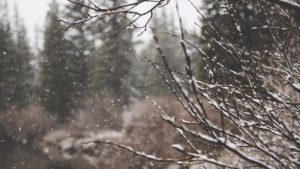
Photo by Arun Kuchibhotla on Unsplash
This morning, in the pause of winter and our first big snowstorm, my partner and I talked about our plans, our dreams, and our progress. Later, I went out to walk in the snow and I suddenly saw another layer to wanting, another step closer to making amends to my chained wolf.
Wanting is just the beginning. Making a Christmas list is only the top step. What’s the list under the Christmas list, and the list under that? What is it I really want, independent of anyone else? What about the dreams I hold in common with no one, that are just about and for me? If I was free — If my wolf could bound through the snowy landscape and disappear into the Yule forest — what would I want? If we could escape judgement, our own and others’; escape for a moment our stories and labels and self-definitions; escape family, social and tribal expectations; escape our ideology (most imprisoning of all) and want, honestly, nakedly, with all our hearts, what would that Christmas list look like?
In other words, it’s not about the perfumed body oil (Aphrodisian Fire, by the way, from Kate’s Magik). It’s about touch, scent and caring for my thinning skin. It’s about deliberately honoring my own feminine sensuality.
I don’t need any particular product, cosmetic, clothing, gizmo or piece of technology in order to honor my own feminine sensuality, although there are plenty of things to buy that might support that want, including Aphrodisian Fire, but I see now those are really just symbols. I have the power to honor my sensuality in the way I live — in the choices I make about who I connect with and how, and how I treat myself.

Photo by Caley Dimmock on Unsplash
Santa hasn’t got my choices in his sleigh.
I’m very attached to the dreams my partner and I hold in common. I love our vision, and I’m invested in it. It’s going to take a lot of money, and we don’t have that right now.
Maybe we won’t ever have it.
Maybe I was a damn fool (again) and I should never, never, have listened to someone who says it’s okay to have needs and want them met. Maybe I should walk away from my wolf again, and this time never come back. Let it starve to death.
But maybe our grand vision and plans are only the top layers of what I really want. Maybe the plan is the wrapping paper around the real treasures of self-reliance; living as part of a complex, self-sustaining system; building independence from the energy grid and a culture I largely can’t support; fostering community and trusting in my greatest joy … writing.
I don’t have to wait for the plan to happen to have those things. I don’t need money. I don’t need to wait for someone else. I don’t need to brutally imprison or eliminate my wants and needs. I can be learning, building and transforming my life right now, today, from the inside out. I can, day by day, draw a step closer to my wolf with food, with water, with a gentle hand and with compassion, and maybe, one day, come close enough to remove the chain and let the poor creature go free and wild into the world, wanting and needing as it will.
So, I’m making a list and checking it twice. Or three times. I’m peering underneath the items, things, objects, stuff on that list. What is it I really want? What am I really longing for? And if I look under that, what do I find? What are the deepest wants and needs?
Merry Christmas, everyone.

Photo by Galina N on Unsplash
All content on this site ©2017
Jennifer Rose
except where otherwise noted
by Jenny Rose | Sep 21, 2017 | Connection & Community, Emotional Intelligence, Holistic Management
Middle age is great fun. I’m constantly amused at how much time I spent during the first half of my life being ineffective. I’ve had heartfelt intentions, goals and plans and I’ve worked hard, but I’ve never understood a thing about simply letting life be. I know all about discipline and almost nothing about surrendering to the natural flow of anything, including myself.
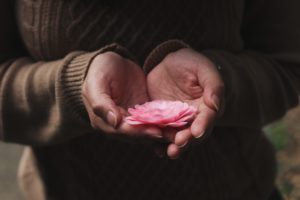
Photo by Ester Marie Doysabas on Unsplash
A few months ago I read an article about what makes plants happy. It was a revelation.
I call myself a gardener. During some periods I grew most of my own vegetables and herbs. It was a lot of work. In Colorado, water was always a problem, and in my rural gardens deer were a constant threat. Keeping a garden weeded, mulched and watered, along with raising two little boys, working, and running a household on a shoestring, was quite a challenge. I thought I knew a lot about gardening.
Here in Maine I don’t garden. We don’t have dedicated garden space protected from the deer, for one thing. For another, my diet has changed and I mostly eat meat now. I’m also older, my knees complain bitterly if I spend a lot of time kneeling, and my body does not want to bend over in a garden every day.
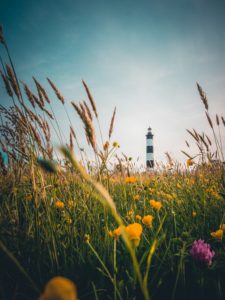
Photo by Louis Maniquet on Unsplash
On the other hand, we probably have thirty or more apple trees, wild raspberries (red and black), wild strawberries, highbush cranberries, blueberries, elderberries, roses, an ancient and persistent grapevine of unknown variety, sugar maples, pear trees and nut trees spread out across our land. The whole place is a garden.
We also have a short hedge of beach roses, thickly thorned and tough, running right along the road on the east side of the house. It gets the snowplow drifts of snow, ice and sand in the winter and the heat, exhaust and sometimes trash of every passing vehicle in the summer. I couldn’t kill them with an axe. It’s not a tall hedge, but it blooms pink in the spring and provides a small barrier between the house and the traffic. In this season it’s loaded with fat red round rose hips.
In the spring, we saw a lot of dead wood in the rose hedge and we began to give it a heavy pruning. It had been neglected for years, and I was certain it would come back, thicker and healthier than ever. It was miserable to work on because the thorns, though short, are numerous and tough, and defy the heaviest work gloves. We got about halfway through the task and then Spring caught us up, along with many other projects, and we never finished pruning the hedge. I raked up what we did take out, pitched the debris over a bank so the thorns were out of the way, and did nothing else for it. The denuded hedge looked spiky and ugly until it leafed out.
In the ensuing months I’ve watched that hedge bloom as usual with its bright pink flowers. One day I saw wild buttercup was also blooming in the places we’d pruned. Wild violets crept around the edges. Yellow hawkweed moved in. After the buttercups came white and yellow daisies. Then a froth of Queen Anne’s Lace draped around it, and tall purple clover beckoned the wild bees. As those faded, I recognized goldenrod and wild asters beginning to grow. Every couple of weeks my partner mows between the hedge and the house. That’s the only care and attention it ever gets.
Wildflowers have bloomed, each in their season, mingling with the roses, all summer and fall. Now there’s a foam of purple and white wild aster and the roses are blooming for a second time, mingling with hips. The hedge is a riot of color.
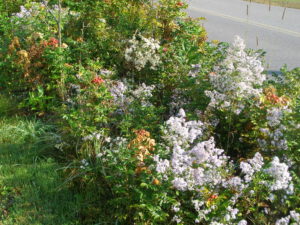
Beach rose hedge 09/17
This takes me back to the article I mentioned about what makes plants happy.
The article points out that plants grow in the wild according to their evolution, needs and contribution in a system. Some plants are tall and grow in isolation. Others are immensely social and form clumps or swathes. Some plants like to creep along the ground and grow low. Others are quite high and grow with tall grasses because they need the support of the surrounding stems. Look at a natural meadow or field in summer that hasn’t been grazed or recently mown, and you’ll see a system of plants and grasses growing together with no input from humans. There are no bare places that need to be mulched. Nobody comes along and dead heads and tidies things up. As flowers fade and plants die, or are fed on, vegetable matter and seeds fall to the ground and become food or sprout into the next generation of plants. The meadow or field, if healthy, will have a full complement of insects, birds and small rodents present, and so on, up the food chain.
Okay, you get the picture. Biology 101, right? But that’s not a garden.
A garden is where we prepare the ground by banishing “weeds;” amend, dig and turn the soil by exposing it and sterilizing it and wearing out our backs; spend money protecting the area with fences, animal repellents, insecticides and herbicides; buy bags and bags of expensive manure, peat, top soil and mulching materials; spend more money buying plants, often without particular regard to whether they’re native to our area and with no idea or interest in how they grow in the wild; and plant them in solitary confinement, carefully spacing them out in sad little oases amid the mulch. We do not give them appropriate companions or communities, allow them to build a family around themselves or allow them to make the contributions they were evolved to make to other plants and wildlife.
We hold gardens to our own standards of neatness, cleanliness, obedience and beauty. We cut and tidy away brown leaves and spent blossoms lest they offend the eye, never imagining we’re depriving our plants of the free food they were evolved to need. We plant to please our color and variety preferences, never asking ourselves or bothering to find out what those particular plants need in order to be happy. We never imagine ourselves a shrew, or a chipmunk, or a grasshopper, and it doesn’t occur to us to lie on the ground with our chins in the dirt and appreciate the complex layers of plant life covering it. The only view we consider is the one from above, and the only layer we see from that vantage point is the top one.
That’s what we call a garden. Isn’t it beautiful?
We humans have an incorrigible, idiotic kind of blind arrogance, myself included. I confess I never once thought about observing how Nature gardens and modeling my gardens on hers. Not once. Yet Earth has survived for millions of years, creating rich, self-sustaining forests, swamps, grasslands and other habitats without the interference of human beings. We don’t think about the plants’ point of view, though. We come along, wear out our bodies, spend money, try to reinvent elegant and sustainable life systems and wonder why gardens don’t thrive.
Duh.
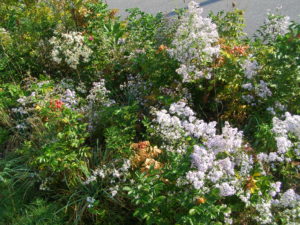
Beach rose hedge 09/17
I’ve been thinking about this article about what makes plants happy for months, and watching our little rose hedge. As we move into fall, I spend a certain amount of time pruning away dead wood and crowded saplings in many different places. We’ve cut a couple of old and dangerous trees. As I work, I carefully lay all the debris at the base of the plants I’m working on. I don’t uproot things. I don’t disturb the soil or the layer of wet rotting leaves on the forest floor. I cherish the sight of mushrooms growing everywhere, because I know they signal a healthy mycelium net underground, serving every plant and tree on the place and beyond. Apples and berries fall and rot where they lay, sinking back into the ever-richer earth. I notice how the wildflowers grow and spread and who they grow and bloom with. I’m making friends with the low ground-covering plants: Wild chamomile, wild strawberry, white clover, wild basil with its purple flowers, the sweet little violets and rabbit’s foot clover.
Unless in our way, we let trees lie as they fall and rot over time. We run the mower over autumn leaves and let them lie. We carefully stake volunteer or rodent-planted saplings to avoid mowing them, so the next generation of black walnut, maple, oak and beech can grow. We leave the tent caterpillars alone, because they provide food for birds, bears and other creatures.
I realize now all my neat gardening was driven by perfectionism, by a desire to feel in control, and by a need to please the eye of myself and others. I invested a lot of sweat equity in trying to garden “right” without ever questioning what that really meant. I made it much, much harder and more expensive than it ever needed to be.
It’s worth noting this is exactly the way I treat myself.
The rose hedge reanimated itself. It grows in the most inhospitable area of the whole place, but it knew just what to do. I stood back, let it alone and marveled.
You know what? I take it back. I’m not a gardener. But I do humbly enjoy a 26-acre garden.
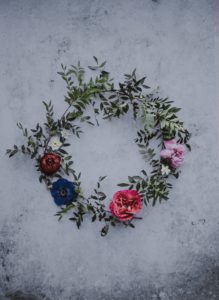
Photo by Annie Spratt on Unsplash
All content on this site ©2017
Jennifer Rose
except where otherwise noted
by Jenny Rose | Jul 20, 2017 | A Flourishing Woman, Body

Photo by Leon Liu on Unsplash
Last night we danced. I’m patiently and persistently attempting to root a dance group into this community. It’s taking time, but I hope in the end to have a healthy core of four or five women with whom to share this sacred practice.
As I danced, I remembered an old friend with whom I danced in Colorado. She used to often say, at the end, as we sat in a circle holding hands, “It’s so good to be in the body.”
Not in the head, where family and other relationships, financial and political complexities, expectations, rules, to-do lists and all our internal voices reside, but in the body, right now.
Our bodies contain a childlike innocence and a wisdom beyond words. They communicate to us the truth about how things are with us via feeling and sensation. Patiently, they carry us through our lives, our most loyal and faithful companions. Persistently, we neglect, abandon and abuse them.
Somewhere along the way, we’ve learned to reject, be ashamed of and hate our physical being and experience. Now we’re to the point where bodily functions tied to being biologically female are a matter of political incorrectness and a hate crime. Social pressure is increasing to eradicate the very words that define female physical experience.
But dance is for everybody in every body, and the spiritual practice of dance has taught me to honor, protect and care for my physical self in new ways. There are no labels in dance, no gaslighting, no power-over that seeks to diminish or limit my physical history or expression. Dance is wordless, so there are no language police. Dance is the freedom to belch, to fart, to wiggle, to jiggle, to giggle, to cry, to shout, to play and to sweat.
Allowing my body to be and joyfully inhabiting it has been a powerful act of self-love. It means allowing my hair to grow as it will, where it will, in the color it is. It means moving with dignity and pride. It means gratitude, for my life is a journey mapped onto my flesh. Every mole, freckle, stretch mark, scar, lump, bump, line, wrinkle and vein holds part of my story, and I honor story.
Being in my body is a powerful act of surrender, not to what the culture says I must be or not be, not to what I think I should embody or not embody, but to what I am. Simply that. The unique, miraculous complex system of genetic material, living tissue, viruses, bacteria and chemical processes that I am.
Allowing my body to be is a peace treaty. My body is not for the pleasure or evaluation of others. It’s not for sale. My body and I owe nothing to anyone, not explanation, apology, conformity, obedience and especially not shame. I refuse to go to war over gender, sexuality or political correctness ideology. I decline to support or participate in self-hatred or hatred of other bodies. The power of my body transcends the judgements, criticisms and opinions of others.
The deepest language I know is of the body. Words are inadequate to my passion, to my love, to my creativity. Spoken and written language fails to convey the richness of my body’s capabilities.
The tick crawling high on the nape of my neck along my hairline, the feel of its tiny claws stirring each hair as it seeks a good place to fasten on, gives me a physical experience so vivid and visceral it cannot possibly be conveyed in words. My skin shrinks, telling me what the sensation is before I examine the cause with my eyes. Undisturbed hair around its path rises, quite automatically, in response to the small but ominous trespass. It feels solid and smooth as an apple-seed between my thumb and finger as I pinch it off. It hurries up and down a bookmark, chestnut colored, as I transport it down the stairs, almost as though it knows it’s been seen, recognized and a death sentence passed.
We come out of our favorite restaurant after a meal on a hot, humid day and find a snake clothed in brown and green, voluptuously twined around our right front tire. My partner stoops and grasps it and it curls and writhes as it dangles from his hand, twisting between the newly-laid black tar and the heavy sky, glaring with sun, humid as a steam bath. My partner takes it into a nearby field and as he comes back he holds out his hand with a rueful expression, showing me beads of bright red blood, dazzling as rubies, on his finger, and two parallel shallow cuts that sting, he says, like paper cuts.

Photo by Leon Liu on Unsplash
Last night I danced with the tick, the snake, the rasp on my knee from falling on the front cement steps, their uneveness hidden by the encroaching hostas, blooming now on thick, fleshy stems, their lavender flowers plundered all day by bumblebees.
I danced with the rattling air conditioner lodged into a window of the recreation center activity room. As usual, we traded the rise in heat and humidity in the room with the lower and quieter fan setting.
I danced with a dead fly on the wood floor, trying to avoid stepping on it with my bare foot. I danced with a living large black ant, bewildered, crawling across what must have seemed like acres of flat, featureless terrain, also not wishing to step on it, but too involved in the flow of the music to stop and take it outside.
I danced with my breasts and belly and thighs, with my feet and elbows and wild hair. I danced with trickles of sweat and a wet upper lip. I danced with my tattoo and swaying earrings and sliding silver bangles. I let myself go. I let myself be. I let myself sink into my body as though sinking into a lover’s arms, for I am my body’s lover, and it is mine.
I danced, and remembered again how good it is to be in the body.

Photo by David Hofmann on Unsplash
All content on this site ©2017
Jennifer Rose
except where otherwise noted
by Jenny Rose | May 11, 2017 | Emotional Intelligence, Feelings, Happiness
For many years, I’ve been a story teller. I’ve told stories in nursing homes, schools, at seasonal events and in women’s circles. I think of stories as medicine, as guidance, as blueprints for living. Old stories from cultures around the world contain information we’ve forgotten or lost about how to live well.

Photo by Syd Wachs on Unsplash
It’s striking how often I share a familiar and oft-told story with an audience that suddenly turns out to be what I most need. Oral stories, if written on a page, look static and lifeless. They’re not. An oral story lives. It twists and turns and wriggles unexpectedly in the mouth. Every time I tell a story it’s a different telling than I’ve ever done before. Every time I tell a story I’m different than I was the last time I told it. Every audience is different.
I’ve discovered blogging is like that. As I blog, I think of the reader. I blog to make an external connection. As I create posts, though, I also discover deepened connection with myself. My writing reveals my truth to me, and shines a light on the places where I’m not living what I know is my truth.
Last week I posted about quitting. In essence, I gave permission to all of us to change, to grow, to seek happiness in our work and in our lives. Ever since I resigned from my job (last day will be Saturday) and wrote that post, I’ve noticed an internal feeling of rediscovery, freedom and fizzing joy.
I only worked 20 hours a week at that job, but the choice to force myself to do it, even though it didn’t make me happy or meet my needs, cast a shadow of apathy over the rest of my life. It dulled my response to my own distress. It fed all those powerful voices that tell us there’s no help for it. We have bills to pay. We have responsibilities, duties and obligations. The most sinister voice of all says this is the best we can hope for or deserve.
I was empowering fear, not love.
All of a sudden, I’m operating with new clarity, the kind of clarity that the right story at the right time brings. This week I’m acutely aware of what’s working well for me and what’s not. I feel my power to choose afresh. I’m not motivating out of fear. Somehow, fear is taking a vacation. I’m motivating out of curiosity, pleasure and the desire to actually be happy.
For me, this is a crime of immense proportions.
I want to be happy. It occurs to me this isn’t a childish pursuit. It’s the pursuit of real personal power.
I follow a blog by Dr. Sharon Blackie, who is a writer, psychologist and mythologist. I’m reading one of her books, The Long Delirious Burning Blue, which has a passionate delicacy I haven’t experienced in a new read for a long time.
Dr. Blackie recently returned to the place she calls home in Connemara, Ireland, and her last couple of blog posts are about taking a walk with her dogs on the land that she loves.
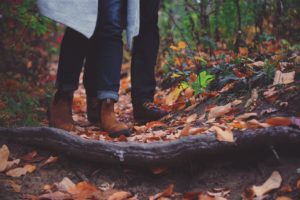
Photo by Takahiro Sakamoto on Unsplash
That’s all. Taking walks. She posts pictures of the lochs, a stream, the bog and the mountain. There are pictures of her dogs, and I imagined wet, muddy paws and soft black and white coats tangled with leaves and stems. I think these posts are among the most joyful and powerful things I’ve ever read, not because Dr. Blackie is an extraordinary scholar and writer, which she is, but because she writes as a woman who’s come home to the place she belongs after a long time away. Her delight and reverence for the land and the life it supports radiate from every word and picture.
That’s how I feel this week, but my homecoming is internal rather than external.
I’m familiar with some of my terrain. Over the years, I’ve learned some of what I am. Always, though, there have been caverns, edges and deep forest I haven’t explored. Perhaps I knew all of myself before my memory in this lifetime begins, but if so, I’ve forgotten.
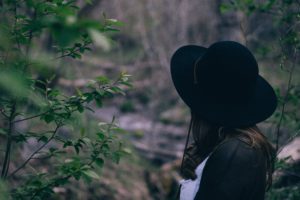
Photo by Cameron Kirby on Unsplash
This week I’m a wanderer, an explorer, a solitary traveler in my own psyche. I leave my well-worn internal paths to roam under trees. I follow the sound of water. I read my own spoor and run my hands over moss-covered rocks. I hunt in vernal pools for singing frogs the size of my toes. I wade through bogs of memory, getting my feet muddy and losing my shoes.
I’ve found old, abandoned structures smelling of rot and damp where birds nest and bats cluster. I’ve stumbled upon shallow graves where, once upon a time, I discarded and abandoned parts of myself. I’ve tripped over fallen idols, are now covered in a lacy blanket of ferns, found forgotten altars and pulled mats of dead leaves out of fountains I haven’t seen in years so clear water can flow again.
I’ve found shed skins whispering and rustling with memory, nearly invisible overgrown paths, and ruts and scars from old burns, floods and landslides.
I suddenly remember the happy feeling of waking early in the morning and going straight outside. I release myself from the expectation that I’ll work well in the last third of the day, a thing I’ve never in my life been able to pull off. I listen to music I love. I read what interests and moves me. I write lists and journal entries, blog posts and edits for my book.
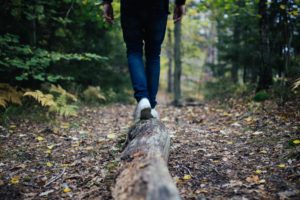
Photo by Jon Flobrant on Unsplash
Like Dr. Blackie’s dogs, I follow what catches my attention. I move along scent trails, noting the passage of all my selves, spiraling from what I’ve been to what I’ll become and back again. I dance from thought to thought, from word to word, from dream to dream. I cast myself into a wider pattern of life.
It’s not that I don’t want to do anything. On the contrary, I want to do a hundred things. I want to do much more than I did when I was structuring my time and energy around my job. I can hardly wait to get out of bed and see what the day brings. I want to play outside, take care of tasks inside, read, write, watch the birds at the feeders, stretch, dance, swim, listen to music, make a list and check things off, be present in my relationships, make new friends, pursue intriguing new connections, earn money joyfully, and see how much I can want and how gloriously I can dream.
I’ve written about leaving home before, and in that post I wrote that in some counterintuitive way leaving my old external home in Colorado allowed me to begin to finally come home to myself internally and reclaim my power. I’ll never think of home solely as a one-dimensional place in the world again. Home is not just a house, not just a beloved landscape, but the place where my dearest friend, my most passionate lover and my most loyal companion reside, along with my deepest power. Home is my own wide-flung arms, my own pulse and breath, my own joy. Home is me, myself.
Somewhere along the way, we forgot that the most important things are also the simplest. There’s great power in being happy. If happy is missing, life is muted and apathetic at best. This is when the power of boredom and the power to quit come to our aid. This is when choice becomes something we must fight to reclaim as if our lives depend on it … because they do.
Claiming the power of happy. My daily crime.

Photo by Senjuti Kundu on Unsplash
All content on this site ©2017
Jennifer Rose
except where otherwise noted





















